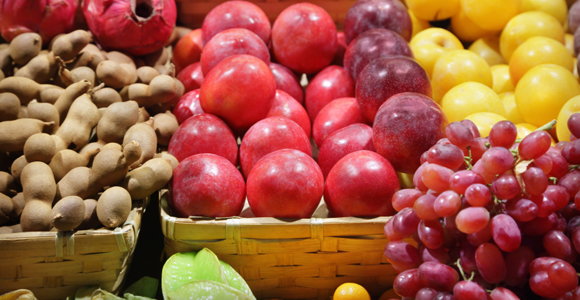A widely held belief exists that eating healthy is expensive. However, a study conducted by the United States Department of Agriculture (USDA) found that, healthful eating can actually be relatively inexpensive depending on food choices. We've put together ten good-for-you foods that cost under a buck.
1. Fresh Fruits and Vegetables
Fruits and vegetables pack a powerful nutrition punch. They contain a variety of vitamins, minerals, and antioxidants that provide benefits for the entire body.
According to the USDA, the average cost of fruits and vegetables is approximately 40 to 50 cents per cup. The least expensive fresh vegetables are potatoes, lettuce, eggplant, greens, summer squash, tomatillos, and carrots. The most economical fruits are watermelon, bananas, apples, pears, pineapple, and peaches. Shopping for produce that is in season will further reduce costs and provide the most nutrition and best flavor.
2. Frozen and Canned Fruits and Vegetables
While given a reputation of having a lesser nutrient value, canned fruits and vegetables can be just as healthy and economical (if not more so) as their fresh counterparts.
5 WAYS TO EASILY ADD GREENS INTO YOUR DIET
3. Oats
Oats are superstars in the nutrition realm. These whole grains are low in calories, high in fiber and protein, and are a rich source of many vitamins, minerals, and beneficial plant chemicals. Oats offer protection against disease and reduce health issues that may already exist like high cholesterol or blood sugar. Oats are readily available, easy to incorporate into your diet, and inexpensive, costing only about 15 cents per serving.
4. Beans
Beans are a low-fat and versatile protein that help lower cholesterol, reduce heart disease and cancer risk, stabilize blood sugar, relieve constipation, assist with weight management and lower blood pressure. Delicious and economical, dried beans cost just around seven cents per serving while canned beans cost about 16 cents.
5. Tea
Tea, made from the bag, costs about 12 cents per serving and is worth every penny. This no-calorie beverage helps lower blood pressure, prevent cancer, and reduce the risk for stroke. Tea is also an antiviral, anti-cavity, and anti-allergy powerhouse.
6. Nuts
Nuts reduce the risks for coronary heart disease, diabetes, cancer, and many other causes of mortality. All nuts contain some sort of health-promoting property. Eat a variety of them to enjoy all of the nutrition they have to offer. Here are just a few things you'll find inside them: plant-derived omega-3s fatty acids, fiber, protein, vitamin D, calcium, copper, iron, magnesium, niacin, folate, zinc, and antioxidants. Depending on the nut you choose, you can spend anywhere from a few pennies to 30 cents per serving.
7. Yogurt
Yogurt contains live active cultures, protein, calcium, and B vitamins. This super food has anticancer properties, lowers cholesterol, and wards off unfriendly bacteria while promoting and preserving intestinal health.
Yogurt varies in flavors, types, and prices but on average, yogurt costs around 80 cents per serving. For a more economical yogurt, make it at home.
8. Brown Rice
Brown rice, which contains a number of nutrients and antioxidants, is a whole grain that has been shown to reduce diabetes risks, assist with weight control, help lower and control blood sugar, and possibly inhibit breast and colon cancers. Brown rice costs about 20 cents per serving.
9. Canned Tuna in Water
Canned tuna is perhaps one of the cheapest animal proteins. At just around 75 cents per serving, this low calorie fish delivers omega-3 fatty acids that may decrease triglycerides, lower blood pressure, improve arthritis symptoms, and reduce the risk of heart disease.
10. Tomato Sauces and Salsas
Fresh tomatoes are nutritious, but the processed tomato products are where the real nutritional power is. That's because processing breaks down the plant cell walls to allow the body to absorb the antioxidant, Lycopene. Lycopene has been linked to reducing cancer, cardiovascular disease and macular degeneration. Tomato products vary in price but can be as economical as five cents per serving.
Mandy Seay is a bilingual registered and licensed dietitian who holds both a bachelor's degree in nutrition and in journalism. After gaining 30 pounds while living abroad, Mandy worked to lose the weight and regain her health. It was here that she discovered her passion for nutrition and went on to pursue a career as a dietitian. Mandy currently works as a nutrition consultant and freelance writer in Austin, Texas, where she specializes in diabetes, weight management and general and preventive nutrition. She recently published her first book, Your Best Health, a personalized program to losing weight and gaining a healthy lifestyle. Please visit Mandy's website at Nutritionistics.com.



